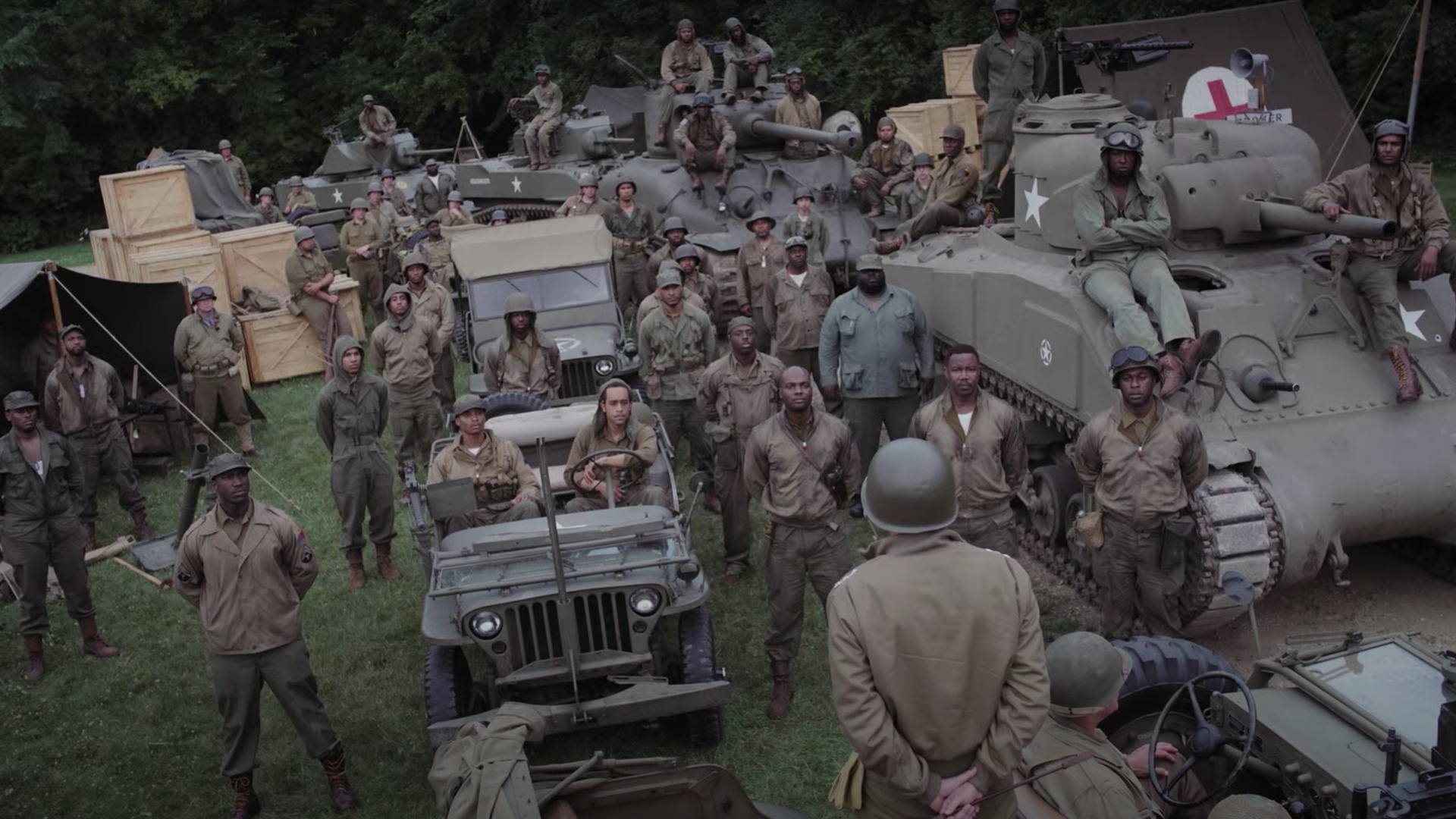

Gen. George Patton didn’t believe in the Black soldiers of the 761st Tank Battalion.
Writing in his memoir “War As I Knew It,” Patton recalled inspecting the 761st, known as the Black Panthers, when they arrived in Europe in October 1944. “Individually they were good soldiers, but I expressed my belief at the time, and have never found the necessity of changing it, that a colored soldier cannot think fast enough to fight in armor,” Patton wrote.
Even as Patton gave the unit a memorable pep talk — reported by, among others, NBA legend Kareem Abdul-Jabbar in his book about the 761st — the famous general put race at the middle of their mission.
“Men, you’re the first Negro tankers to ever fight in the American Army. I would never have asked for you if you weren’t good. I have nothing but the best in my Army. I don’t care what color you are as long as you go up there and kill those Kraut sonsofbitches,” Patton told the battalion soon after it arrived in Normandy. “Everyone has their eyes on you and is expecting great things from you. Most of all your race is looking forward to your success. Don’t let them down and damn you, don’t let me down!”
Within weeks, the 761st lived up to Patton’s words and disproved his private doubts.
Subscribe to Task & Purpose Today. Get the latest military news, entertainment, and gear in your inbox daily.
The battalion’s motto was “Come Out Fighting,” and for the next 183 days the 761st would do just that, becoming one of the Army’s most effective armored units as it fought in France, at the Battle of the Bulge, and eventually across Germany.
As an independent battalion, the 761st was often sent to where the fighting was most intense. In the unit’s first month in combat, three soldiers were recommended for the Medal of Honor.
“Not for God and country but for me and my people,” recalled Capt. John Long for the National World War II Museum. “This was my motivation pure and simple when I entered the army. I swore to myself there would never be a headline saying my men and I chickened.”
Later this month, the 761st will debut on the big screen in Come Out Fighting, a new movie debuting this month that features the fabled tank battalion. A trailer for the movie came out this week.

In the movie, a patrol from the 761st led by Lt. Robert Hayes, played by Hiram Murray, is ambushed, leaving Hayes cut off from his unit. Trapped behind enemy lines, Hayes encounters Lt. Frank Ross, an American pilot played by Kellan Lutz. The members of the battalion then undertake a somewhat unofficial rescue mission to save the two men.
The movie also features Michael Jai White, Tyrese Gibson and Dolph Lundgren.
While the movie is a fictional account, the real exploits of the 761st Tank Battalion are numerous. Organized in 1942 at Camp Claiborne, Louisiana, the unit endured plenty of restrictions and racist discrimination as it trained across bases in the Jim Crow-era south. One of its first officers was First Lt. Jack Roosevelt Robinson, who as c– the Jackie Robinson who would go on to break the color barrier in professional baseball. But Robinson was – who was court-martialed in 1944 for refusing to move to the back of a segregated military bus at Camp Hood, Texas.
In 1944, though, the unit was deemed ready for combat and sent to France, arriving on October 10.
“I am damned glad to have you with us,” read the note from Maj. Gen. Willard Paul, commander of the 26th Infantry Division, which the 761st would be reinforcing. “We have been expecting you for a long time, and I am sure you are going to give a good account of yourselves. I’ve got a big hill up there that I want you to take, and I believe that you are going to do a great job of it.”
The 761st was on the frontlines as the Allies advanced across France and Belgium. In January 1945, as the Germans launched a counter-offensive that became the Battle of the Bulge, the Black Panthers were sent to secure the town of Tillet, just 12 miles outside of the Bastogne. There, they helped cut off German supply lines into Bastogne, where the 101st Airborne Division was famously holding onto a key crossroads. The 761st attacked German defenders so relentlessly that many soldiers ended up fighting on foot after their tanks were disabled.
According to the National World War II Museum, Lieutenant Moses Dade drove his tank directly into German lines even after the turret had been blown off.
Despite its success in combat, the soldiers of the battalion still struggled to gain the recognition they had earned. The unit was not awarded a Presidential Unit Citation until 1978, and Staff Sgt. Ruben Rivers – one of those three soldiers who was recommended for the Medal of Honor in 1944 – was not granted the award until 1997.
Come Out Fighting premiers in theaters and On Demand on May 19.
The latest on Task & Purpose
- Ukraine claims Russian troops and Wagner mercenaries are fighting each other
- Star Wars’ Stormtroopers are a reminder why marksmanship is so important
- Marine veteran killed while evacuating Ukrainian civilians from Bakhmut
- US Army Special Operations Command has its first female senior enlisted leader
- Marine element conducts short-notice air defense deployment to Middle East